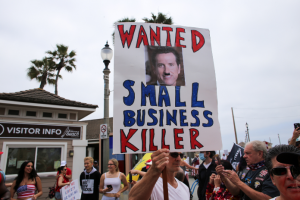On Feb. 19, California Gov. Gavin Newsom signed Senate Bill 29 (SB29), requiring county election officials to mail a ballot to every registered active voter for all elections announced or conducted in 2021—including the potential election that would decide whether to recall him from office.
Following the passage of SB29, many RecallGavin2020 campaign supporters believe it could increase the likelihood that Newsom is recalled. With polls showing the governor's popularity now sinking below 50% and the recall signature campaign breaking collection records each passing week (with currently more than 1.6 million signed petitions), supporters say that the measure may allow more people to vote him out who otherwise would not have voted.
Randy Economy, Senior Advisor and Official Spokesman of the California Patriot Coalition–Recall Gavin Newsom 2020 Committee, said of the grass-roots mission, "What we are witnessing is a movement that has beaten the odds, and we have our nose to the grindstone. Our work continues. Our mission is not done."
Speaking about Newsom's signing of SB29, Economy, who spoke with UncoverDC in early February about the recall campaign, remarked, "He and his cronies at the State Capitol are trying to change the rules in the middle of the game. You have a very angry electorate out there right now, and if everybody has access to a ballot during a recall election, he may have just sealed his own fate."
SB29 serves as an extension to Assembly Bill 860 (AB860), which was put in place before the Nov. 2020 election due to concerns over COVID-19. The bill required all counties to mail out absentee vote-by-mail (VBM) ballots to all registered voters and was set to expire after the Nov. 2020 elections. However, there are two special elections scheduled in the spring to fill vacancies in the Legislature and, as critics of Newsom collect signatures, it's increasingly possible there will a statewide recall election later this year as well. Therefore, the Legislature, including Senator Tom Umberg (D-Santa Ana), who authored the bill, rushed through SB29, an urgency measure that immediately takes effect and covers this year.
The bill passed overwhelmingly along partisan lines in the Democratic-controlled Legislature, with Republicans raising concerns about cost and election security. Assembly Member Steven Choi, R-Irvine, argued that ballots could be sent to individuals who have relocated or died, as was the case with mail-in ballots in the November election. Choi proclaimed during the debate this week, "Protecting the integrity of our elections is one of the most sacred responsibilities of our government, and SB29 provides no safeguards against voter fraud."
Still, despite valid concerns over VBM, based on the state's record voter turnout in the 2020 election, several lawmakers are pushing to make mail-in ballots permanent in California. Assembly Member Marc Berman, D-Menlo Park, introduced a bill in December that would adopt an entirely new voting system for the state. If passed, it would take effect in 2022 and would require election officials to mail every active registered voter a ballot for all future elections.
Using the pandemic as a platform, Berman said of his proposed bill, “In the face of a global health pandemic and an unprecedented onslaught of misinformation trying to undermine voters’ faith in our democracy, California conducted a secure and remarkably successful general election. Given the success of mailing every active registered voter a ballot, as well as other improvements we made in 2020, it only makes sense to make permanent many of the key changes adopted in response to the pandemic.”
 Small businesses damaged by pandemic lockdowns have been a potent source of anti-Newsom fervor. Recent data suggests that half of the state’s small businesses are in danger of shutting down. (Stanton Sharpe)
Small businesses damaged by pandemic lockdowns have been a potent source of anti-Newsom fervor. Recent data suggests that half of the state’s small businesses are in danger of shutting down. (Stanton Sharpe)
According to the Secretary Of State's official election results, as a percentage of eligible voters, California's voter turnout in the Nov. 3, 2020 election was the highest in a statewide election since the presidential general election in November 1952. 17,785,151 Californians voted in the statewide general election. 15,423,301 (86.7%) used a VBM ballot and 2,361,850 (13.3%) voted in-person at a precinct or vote center. That represents a turnout of 80.67% of the state's registered voters and 70.88% of the estimated number of eligible California voters.
The RecallGavin2020 campaign has set an internal deadline of Mar. 10 to have all the petitions collected, with an official deadline to complete the signature-gathering of Mar. 17. As momentum continues to grow, hopes are high that the campaign will collect enough valid signatures to trigger a recall election. In that case, the additional procedural steps decree that the election will happen within four to six months.
California Legislator Kevin Kiley, a former tenth-grade English teacher at an inner-city public high school in his district, summed up the latest event in his state, saying of the recall:
"What’s most telling is almost everyone is attacking the process rather than trying to defend Newsom. One outspoken Recall opponent even called the signature sheets “poisonous petitions.” I happen to think a Recall election this year is ideal timing, as the people of California would have a chance the following year to throw out any legislators who hadn’t caught on that the era of corruption is over. This would assure the Recall is not a one-off event but a fundamental course correction, a brilliant dawn out of the darkness of this past year."


